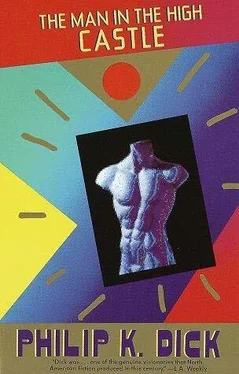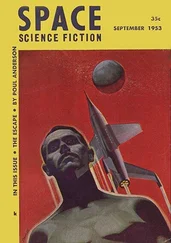And then, too, he might see a slave.
German or South ships docked at the port of San Francisco all the time, and blacks occasionally were allowed off for short intervals. Always in groups of fewer than three. And they could not be out after nightfall; even under Pacific law, they had to obey the curfew. But also slaves unloaded at the docks, and these lived perpetually ashore, in shacks under the wharves, above the waterline. None would be in the Trade Mission offices, but if any unloading were taking place—for instance, should he carry his own bags to Mr. Tagomi’s office? Surely not. A slave would have to be found, even if he had to stand waiting an hour. Even if he missed his appointment. It was out of the question to let a slave see him carrying something; he had to be quite careful of that. A mistake of that kind would cost him dearly; he would never have place of any sort again, among those who saw.
In a way, Childan thought, I would almost enjoy carrying my own bags into the Nippon Times Building in broad daylight. What a grand gesture. It is not actually illegal; I would not go to jail. And I would show my real feelings, the side of a man which never comes out in public life. But…
I could do it, he thought, if there weren’t those damn black slaves lurking around; I could endure those above me seeing it, their scorn—after all, they scorn me and humiliate me every day. But to have those beneath see me, to feel their contempt. Like this chink peddling away ahead of me. If I hadn’t taken a pedecab, if he had seen me trying to walk to a business appointment…
One had to blame the Germans for the situation. Tendency to bite off more than they could chew. After all, they had barely managed to win the war, and at once they had gone off to conquer the solar system, while at home they had passed edicts which… well, at least the idea was good. And after all, they had been successful with the Jews and Gypsies and Bible Students. And the Slavs had been rolled back two thousand years’ worth, to their heartland in Asia. Out of Europe entirely, to everyone’s relief. Back to riding yaks and hunting with bow and arrow. And those great glossy magazines printed in Munich and circulated around to all the libraries and newsstands… one could see the full-page color pictures for oneself: the blue-eyed, blond-haired Aryan settlers who now industriously tilled, culled, plowed, and so forth in the vast grain bowl of the world, the Ukraine. Those fellows certainly looked happy. And their farms and cottages were clean. You didn’t see pictures of drunken dull-wilted Poles any more, slouched on sagging porches or hawking a few sickly turnips at the village market. All a thing of the past, like rutted dirt roads that once turned to slop in the rainy season, bogging down the carts.
But Africa. They had simply let their enthusiasm get the better of them there, and you had to admire that, although more thoughtful advice would have cautioned them to perhaps let it wait a bit until, for instance, Project Farmland had been completed. Now there the Nazis had shown genius; the artist in them had truly emerged. The Mediterranean Sea bottled up, drained, made into tillable farmland, through the use of atomic power—what daring! How the sniggerers had been set back on their heels, for instance certain scoffing merchants along Montgomery Street. And as a matter of fact, Africa had almost been successful… but in a project of that sort, almost was an ominous word to begin to hear. Rosenberg’s well-known powerful pamphlet issued in 1958; the word had first shown up, then. As to the Final Solution of the African Problem, we have almost achieved our objectives. Unfortunately, however—
Still, it had taken two hundred years to dispose of the American aborigines, and Germany had almost done it in Africa in fifteen years. So no criticism was legitimately in order. Childan had, in fact, argued it out recently while having lunch with certain of those other merchants. They expected miracles, evidently, as if the Nazis could remold the world by magic. No, it was science and technology and that fabulous talent for hard work; the Germans never stopped applying themselves. And when they did a task, they did it right .
And anyhow, the flights to Mars had distracted world attention from the difficulty in Africa. So it all came back to what he had told his fellow store owners; what the Nazis have which we lack is—nobility. Admire them for their love of work or their efficiency… but it’s the dream that stirs one. Space flights first to the moon, then to Mars; if that isn’t the oldest yearning of mankind, our finest hope for glory. Now, the Japanese on the other hand. I know them pretty well; I do business with them, after all, day in and day out. They are—let’s face it—Orientals. Yellow people. We whites have to bow to them because they hold the power. But we watch Germany; we see what can be done where whites have conquered, and it’s quite different.
“We approach the Nippon Times Building, sir,” the chink said, his chest heaving from the exertion of the hill climbing. He slowed, now.
To himself, Childan tried to picture Mr. Tagomi’s client. Clearly the man was unusually important; Mr. Tagomi’s tone on the telephone, his immense agitation, had communicated the fact. Image of one of Childan’s own very important clients, or rather, customers, swam up into his mind, a man who had done a good deal to create for Childan a reputation among the high-placed personages residing in the Bay Area.
Four years ago, Childan had not been the dealer in the rare and desirable which he was now; he had operated a small rather dimly lighted secondhand bookshop on Geary. His neighboring stores sold used furniture, or hardware, or did laundry. It was not a nice neighborhood. At night strong-arm robberies and sometimes rape took place on the sidewalk, despite the efforts of the San Francisco Police Department and even the Kempeitai, the Japanese higher-ups. All store windows had iron gratings fitted over them once the business day had ended, this to prevent forcible entry. Yet, into this district of the city had come an elderly Japanese ex-Army man, a Major Ito Humo. Tall, slender, white-haired, walking and standing stiffly, Major Humo had given Childan his first inkling of what might be done with his line of merchandise.
“I am a collector,” Major Humo had explained. He had spent an entire afternoon searching among the heaps of old magazines in the store. In his mild voice he had explained something which Childan could not quite grasp at the time: to many wealthy, cultured Japanese, the historic objects of American popular civilization were of equal interest alongside the more formal antiques. Why this was so, the major himself did not know; he was particularly addicted to the collecting of old magazines dealing with U.S. brass buttons, well as the buttons themselves. It was on the order of coin or stamp collecting; no rational explanation could ever be given. And high prices were being paid by wealthy collectors.
“I will give you an example,” the major had said. “Do you know what is meant by ‘Horrors of War’ cards?” He had eyed Childan with avidity.
Searching his memory, Childan had at last recalled. The cards had been dispensed, during his childhood, with bubble gum. A cent apiece. There had been a series of them, each card depicting a different horror.
“A dear friend of mine,” the major had gone on, “collects ‘Horrors of War.’ He lacks but one, now. The Sinking of the Panay . He has offered a substantial sum of money for that particular card.”
“Flip cards,” Childan had said suddenly.
“Sir?”
“We flipped them. There was a head and a tail side on each card.” He had been about eight years old. “Each of us had a pack of flip cards. We stood, two of us, facing each other. Each of us dropped a card so that it flipped in the air. The boy whose card landed with the head side up, the side with the picture, won both cards.” How enjoyable to recall those good days, those early happy days of his childhood.
Читать дальше










